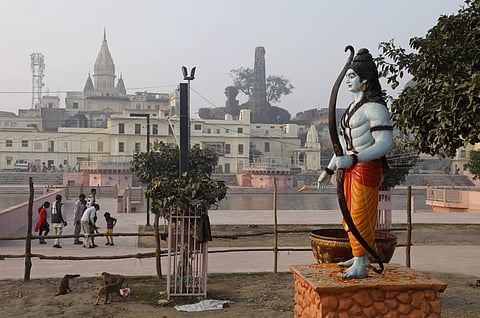

NEW DELHI: Claiming that the Ayodhya verdict legitimises "majoritarianism and mobocracy", Jamiat Ulema-e-Hind chief Maulana Arshad Madani on Monday said a review petition challenging the Supreme Court ruling has been filed exercising a constitutional right and not to disturb "communal harmony".
Hours after the Jamiat Ulema-e-Hind filed the review petition, Madani said if the Supreme Court upholds its Ayodhya decision, the Muslim body will abide by it.
"We have sought review of the impugned judgment on the Babri Masjid-Ram Janmablioomi title suit which was not based on evidence and logic," he said.
The plea seeking review of the verdict which cleared the way for construction of a Ram Temple at the disputed site in Ayodhya was filed in the Supreme Court on Monday stating that "complete justice" could only be done by directing reconstruction of Babri Masjid.
While key litigant, Uttar Pradesh Sunni Central Waqf Board, decided against challenging the verdict, Maulana Syed Ashhad Rashidi, legal heir of original litigant M Siddiq and UP President of Jamiat Ulama-e-Hind, sought review of the verdict on 14 counts.
"The main contention in the case was that the mosque was built by destructing a temple. The court said that there was no evidence that the mosque was built after destructing a temple, the title of Muslims, therefore, was proven, but the final verdict was the opposite," Madani said.
"So we filed a review as the verdict is beyond understanding. Justice has not been done," Madani said.
The review petition has drawn the attention of the court towards a number of important points and the contradictions in the verdict on the Ayodhya case, the Jamiat said in a statement.
The Supreme Court in its verdict had said the entire 2.77 acres of disputed land should be handed over to the deity Ram Lalla, who was one of the three litigants.
The five-judge Constitution bench also directed the Centre to allot a five-acre plot to the Sunni Waqf Board in Ayodhya to build a mosque.
Madani asserted that filing a review petition was every citizen's constitutional right.
"Besides, the legal option, it is also Sharia obligation on us to struggle for getting back the mosque till our last breath," he said, emphasising that a mosque always remains a mosque and is devoted to Allah.
No individual or organisation or board has the right to surrender a mosque in the hope of getting any mosque at an alternative place or site, Madani said in reference to the 5-acre land which the five-judge Constitution bench has directed the Centre to allot to the Sunni Waqf Board.
Responding to a question, Madani made it clear that the purpose of filing the review petition is not to disrupt country's "communal harmony, unity and peace", but to use the privilege provided in the law, to make a review request.
In response to another question, he said the Jamiat moved the court as the Ayodhya judgment does "not pass the test of logic".
"The judgment legitimises majoritarianism and mobocracy and strikes at the very secular fabric of our Constitution and is full of contradictions while paying only sermons to the values of equality and fraternity, but ends up violating these very principles in its relief," Madani said.
On the Uttar Pradesh Sunni Central Waqf Board's decision to not file a review petition, he said it has no bearing on the Jamiat petition.
The final judgment has ended up privileging faith in a disproportionate way, Madani said.
He claimed that the verdict was delivered but justice was not done in the Babri masjid case as it "violated the principles of law and natural justice".
The litigant, in review plea filed through lawyer Ejaz Maqbool, has also sought an interim stay on operation of the verdict in which it had directed the Centre that a trust be formed within three months for construction of the temple at the site.
Rashidi also questioned the direction asking the Centre and the Uttar Pradesh government to allot 5 acre land for construction of a mosque at a prominent place in Ayodhya, saying that such a prayer was never made by the Muslim parties.